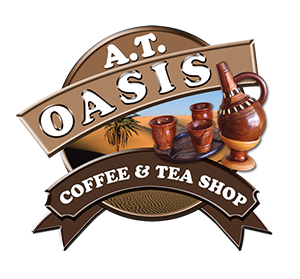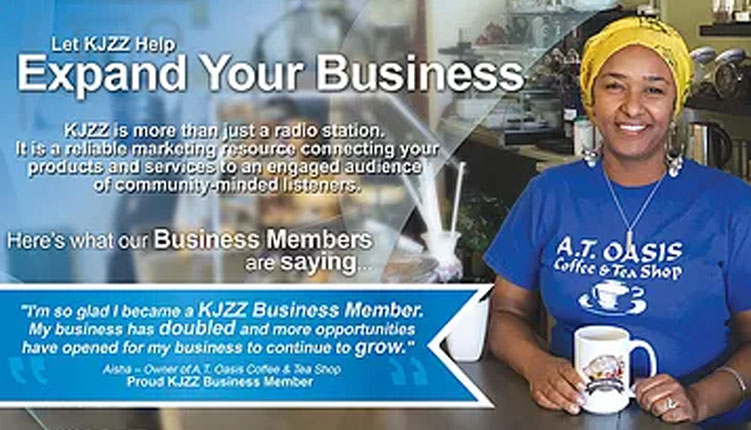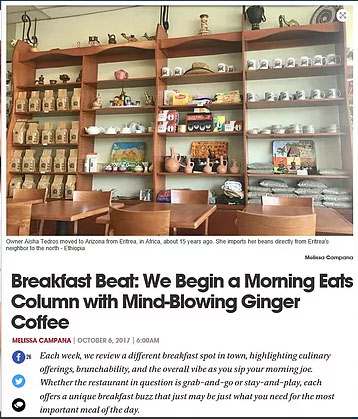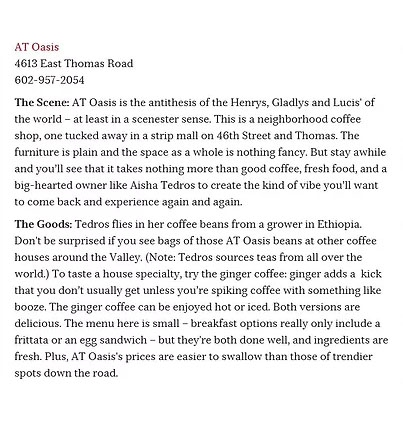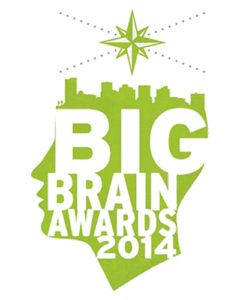
BY PHOENIX NEW TIMES
THURSDAY, APRIL 17, 2014 | 3 YEARS AGO
The Big Brains are here.
We’ve profiled the 15 up-and-coming creatives who are finalists in the categories of performing art, culinary art, visual art, design, and urban vision.
We’ll announce the five winners (one in each category) at Artopia, an evening of food, drink, and art, at Bentley Projects on Friday, April 25. In the meantime, meet your 2014 Big Brain Award finalists.
Aisha Tedros |Culinary Art
“Anyone can do it,” Aisha Tedros says as she prepares a cup of strong coffee flavored with ground ginger, a specialty from her hometown in Africa. “I was always told that about America, and it’s true.”
Tedros moved the United States 12 years ago from Keren, the second largest city in Eritrea, a small eastern African country that’s just north of Ethiopia. Back then, she spoke no English and could neither read nor write.
Like so many others, she came in search of the American Dream, having grown up being told that in America anyone can be anything they want.
Tedros taught herself to speak English, and these days you can hardly get her to stop. The coffee shop owner switches back and forth with ease between English and the six African languages she also speaks.
Tedros says her innate chattiness always set her apart from other Eritrean women. It’s part of the reason she says America immediately felt like home. “When I got here, I called my mom and said, ‘Everyone here is like me!,'” she says with a laugh.
Before opening A.T. Oasis Coffee and Tea Shop in Phoenix with her husband Abdul, Tedros spent years working as a server at Mimi’s Cafe at Mesa’s Fiesta Mall.
A framed letter from the restaurant’s manager sits on a shelf inside the shop. It thanks Tedros for her years of service and commends her for exceptional customer service.
It’s still one of her strongest assets as a small business owner
Sitting at one of small tables in the shop and sipping a cup of coffee (sweetened with two spoonfuls of sugar, at least) Tedros explains that she wants her coffee shop to serve as a community gathering place for both African immigrants and those who might not be familiar with the culture. And, thanks in no small part to her affable personality, it is.
On any given night you’ll find tables of customers enjoying a drink while chatting away. “A lot of Africans, when they come here, they’re a little isolated,” Tedros says. “So I’m trying to bring everyone together.”
But Tedros doesn’t just want her shop to be for African immigrants seeking community. She also sees A.T. Oasis as an opportunity to educate Americans about her culture through something universal: coffee.
Tedros says more and more customers have been coming in and asking to see the traditional Eritrean coffee ceremony. It involves roasting green coffee beans over a burner, grinding them (traditionally, with a mortar and pestle), and boiling the coffee in a special clay pot. Tedros has had to buy more of the pots to accommodate the new customers.
For the ceremony, she sets up each table with its own tray. On it, there’s one of those pots, a set of small cups, sugar, incense, and dates. Guests can then participate in the ceremony by pouring their own coffee and sweetening it to taste. The dates are to be eaten along with the drink. If you come in to try it, Tedros likely will be happy to sit and answer your questions — about coffee, Eritrea, or just about anything else.
Tedros also imports raw coffee beans directly from Ethiopia, in some cases working directly with the farmers. By doing so, she says, she’s able to give them a larger share of the profits than if she were to go through a coffee broker.
She uses only these Ethiopian beans at A.T. Oasis and also sells the raw product to some of the city’s best known coffee shops. The list includes Cartel, Echo Coffee, and Bergie’s.
By: Lauren Saria
